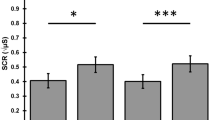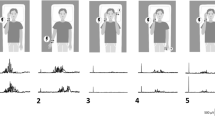Abstract
Phasic and tonic measures of electrodermal activity were examined in a simple habituation paradigm, using innocuous visual stimuli. Separate groups were used to investigate the effects of stimulus significance, as manipulated by instructions. One group had no stimulus-related task (indifferent group), while the other was asked to silently count the stimuli to report to the experimenter later (significant group). Prestimulus skin conductance levels were considered as measures of the arousal level at each stimulus presentation, and the subsequent electrodermal responses were taken as the phasic orienting reflex (OR) elicited by each stimulus. Changes in prestimulus arousal were taken as measures of the tonic OR to the experimental series. Marked group differences were found in both phasic and tonic components of the OR. Some, but not all, of the significance effects in the phasic OR were attributable to differences in arousal. The results are discussed in the context of theoretical accounts of the OR.
Similar content being viewed by others
References
Barry, R.J. (1984a). Preliminary processes in OR elicitation.Acta Psychologica, 55, 109–142.
Barry, R.J. (1984b). Stimulus omission and the orienting response.Psychophysiology, 21, 535–540.
Barry, R.J. (1987a). Orienting and other responses to preliminary process theory. In P.K. Ackles, J.R. Jennings & M.G.H. Coles (Eds.)Advances in Psychophysiology, Vol. 2. JAI Press, Greenwich CT, pp. 285–339.
Barry, R.J. (1987b). Preliminary processes in orienting response elicitation. In P.K. Ackles, J.R. Jennings & M.G.H. Coles (Eds.)Advances in Psychophysiology, Vol. 2. JAI Press, Greenwich CT, pp. 131–195.
Barry, R.J. (1990a). Scoring criteria for response latency and habituation in electrodermal research: A study in the context of the orienting response.Psychophysiology, 27, 94–100.
Barry, R.J. (1990b). The orienting response: Stimulus factors and response measures.Pavlovian Journal of Biological Science, 25, 93–103.
Barry, R.J. (1996). Preliminary process theory: towards an integrated account of the psychophysiology of cognitive processes.Acta Neurobioliae Experimentalis, 56, 469–484.
Barry, R.J., Clarke, A.R., McCarthy, R., Selikowitz, M., Rushby, J.A. & Ploskova, E. (2004). EEG differences in children as a function of resting-state arousal level.Clinical Neurophysiology, 115, 402–408.
Barry, R.J. & James, A.L.. (1981). Fractionation of respiratory and vascular responses with simple visual stimulation.Physiological Psychology, 9, 96–101.
Barry, R.J. & O’Gorman, J.G.. (1987). Stimulus omission and the orienting response: Latency differences suggest different mechanisms.Biological Psychology, 25, 261–276.
Barry, R.J. & O’Gorman, J.G. (1989). Methods and mechanisms in electrodermal studies of omission responding.Biological Psychology, 28, 271–277.
Barry, R.J. & Sokolov, E.N. (1993). Habituation of phasic and tonic components of the orienting reflex.International Journal of Psychophysiology, 15, 39–42.
Ben-Shakhar, G. (1980). Habituation of the orienting response to complex sequences of stimuli.Psychophysiology, 6, 524–534.
Groves, P.M. & Thompson, R.F. (1970). Habituation: A dual-process theory.Psychological Review, 77, 419–450.
Iacono, W.G. & Lykken, D.T. (1983). The effects of instructions on electrodermal habituation.Psychophysiology, 20, 71–80.
Jin, P. (1992). Towards a reconceptualization of the law of initial value.Psychological Bulletin, 111, 176–184.
Maltzman, I. (1979a). Orienting reflexes and classical conditioning in humans. In H.D. Kimmel, E.H. van Olst & J.F. Orlebeke (Eds.),The orienting reflex in humans. Erlbaum, Hillsdale, NJ, pp. 381–392.
Maltzman, I. (1979b). Orienting reflexes and significance: A reply to O’Gorman.Psychophysiology, 16, 274–282.
Maltzman, I. (1990). The OR and significance.Pavlovian Journal of Biological Science, 25, 111–122.
Siddle, D.A.T. (1991). Orienting, habituation and resource allocation: An associative analysis.Psychophysiology, 28, 245–259.
Sokolov, E.N. (1955). The higher nervous activity and the problem of perception.Acta Psychologica 13, 134–135
Sokolov, E.N. (1960). Neuronal models and the orienting reflex. In MA Brazier (Ed.),The central nervous system and behavior: transactions of the 3rd conference. Macy, New York, pp. 187–276.
Sokolov, E.N. (1963a). Higher nervous functions: the OR.Annual Review of Physiology, 25, 545–580.
Sokolov, E.N. (1963b).Perception and the conditioned reflex, Oxford: Pergamon.
Thompson, R.F., Berry, S.D., Rinaldi, P.C., & Berger, T.W. (1979). Habituation and the orienting reflex: The dual process theory revisited. In H.D. Kimmel E.H. van Olst & J.F. Orlebeke (Eds.),The orienting reflex in humans, Erlbaum, Hillsdale NJ, pp. 21–60.
Wilder, J. (1967).Stimulus and response: The law of initial value. Bristol: Wright.
Author information
Authors and Affiliations
Corresponding author
Rights and permissions
About this article
Cite this article
Barry, R.J. Stimulus significance effects in habituation of the phasic and tonic orienting reflex. Integrative Physiological & Behavioral Science 39, 166–179 (2004). https://doi.org/10.1007/BF02734437
Issue Date:
DOI: https://doi.org/10.1007/BF02734437




